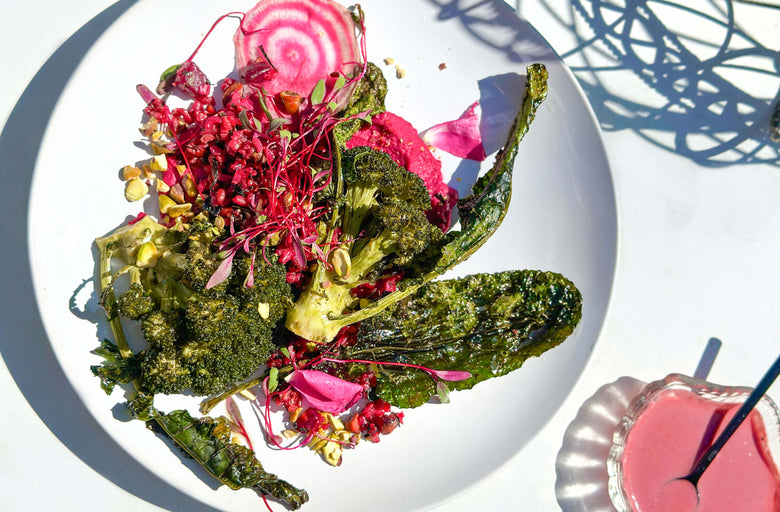Our bodies are innately brilliant. They’re constantly communicating when we need more or less of certain nutrients, when we’re thirsty, hungry, sleepy, or satiated, and more. Body intelligence—a foundational pillar of our Nutritional Philosophy—is all about listening to these internal cues and, as a result, building a body we can trust and listen to.
Because body intelligence is unique to everyone, so is how it’s defined. We reached out to the experts in our orbit, from scientists and well-being experts, to beloved chefs, to our very own founders, for their takes.
Body Intelligence Is…
A Priority
“The number one thing we can do for our health is to cultivate a deep sense of body intelligence. Based on principles of mindfulness, body intelligence entails developing a profound sense of self-awareness, particularly surrounding our motivations towards eating and how we feel in relation to each food that we eat.
Over time, you’ll start to recognize common food cues, as well as which foods strengthen your focus, help you feel good, or perhaps detract from these. When we develop awareness without judgment, we are then empowered to make conscious choices, informed by the factors of each unique context, that ultimately allow us to eat as healthily as we can.”
—Dr. Uma Naidoo, nutritional psychiatrist, chef, nutritionist, and author of This Is Your Brain On Food
Listening In
“Body intelligence is about building a body you get to listen to; it's a privilege. So many of us have been taught to silence cravings and feelings, but what if instead we work on cultivating a gut that tells us exactly what we need to hear? We cultivate a relationship to that 'gut feeling' and LISTEN. No one knows your body better than you do."
—Danielle DuBoise, Sakara founder and co-CEO
A Conversation
“I think there’s an act of building a conversation with your body, understanding, Oh, I'm craving this. Well, maybe you're craving that because your body is lacking that nutritional aspect of that thing. I think that when we go to the market, we visually connect with something, and that's another aspect of how your body is talking to you. That's really important to just build conversation with your body and understand what you need, not being so restrictive.”
—Camille Becerra, chef, food storyteller, and food stylist
A Daily Practice
“Body intelligence is the key to connecting [our] physical self with the foods around us. We encounter food three times a day, sometimes more, and we have to make a decision… When you eat something that's really good, you feel great, like after eating that Cobb salad or bowl of fruit. Through experience, I know I'm going to feel better eating some foods than others. We need to make a more deliberate effort to listen to our bodies because our bodies tell us [these] things.”
—Dr. William Li, health defense specialist, and author of Eat to Beat Disease: The New Science of How Your Body Can Heal Itself
In Flux
“There’s this whole concept of mindfulness and paying attention to your gut and your natural signals. Well, if your natural signals are off because of what you're eating (i.e., ultra-processed foods and excessive sugar), then, as much as you try, how much of your instinctual eating can you pay attention to?”
—Dr. Shebani Sethi, metabolic psychiatrist
Slowing Down
“Body intelligence is simply slowing down enough to actually check in with what feels and doesn’t feel good in your body. If you live your life from that place, you’ll always feel better. You have to remove attention from the ‘out there’ and constantly reference the inside of your experience to have connection with the divine of your knowing, to have body intelligence and spiritual intelligence.”
—Dr. Jennifer Freed, psychological astrologer, and author of Use Your Planets Wisely
Our Life Force
“Every ancient tradition understood that human beings are more than their physical bodies—that they have a life force. That life force, or Qi, as it is known in Chinese medicine, is your body’s intelligence. It is the way the body communicates internally to synchronize and coordinate so all your systems work together.”
—Dr. Jill Blakeway, acupuncturist, women’s health specialist, and founder of the Yinova Center
Freedom
“Food is information. Every bite you take is either working to create health and clarity for you or, on the flip side, creating disruption and disease. It's so empowering to know that what I choose to eat can transform my health and life."
—Whitney Tingle, Sakara founder and co-CEO
Honoring Cravings
“Create an atmosphere where there's not a hierarchy around foods. Create an atmosphere where cravings are honored. I think that if we’re able to teach kids balance and to listen to their hunger and satiety cues internally, that they'll actually be better off for it. That's something that we talk about in my practice with both children and adults.”
—Maya Feller, MS, RD, CDN, clinical nutritionist, and author of Eating From Our Roots: 80+ Healthy Home-Cooked Favorites From Cultures Around The World
A Check-Engine Light
“Cravings for things that aren't particularly healthy, like ice cream, sugary things, or white flour carbs, are a really good time to ask, ‘All right, what's my body missing? Or what am I missing?’... Maybe you're not sleeping well at night and you're craving more sugar during the day because you're tired. If you're vegan and you're suddenly craving ice cream, or even if you're not a vegan, do you need more fat? Do you need more calcium? Do you need more energy?”
—Dr. Aviva Romm, Sakaralite, herbalist, midwife, and MD






